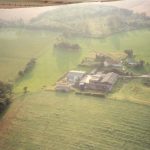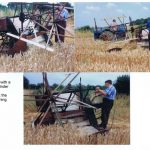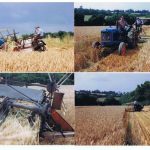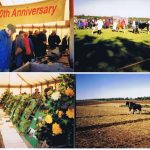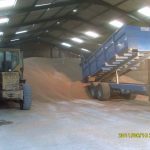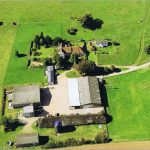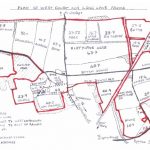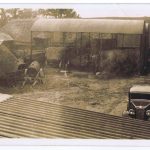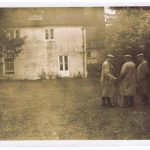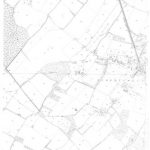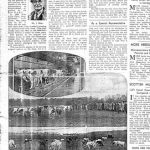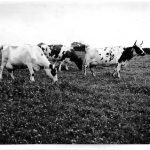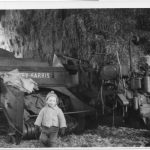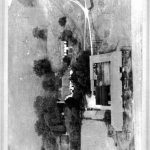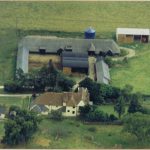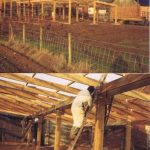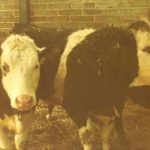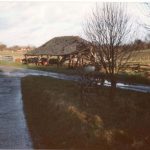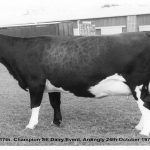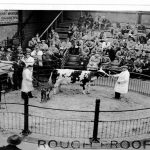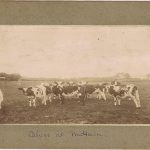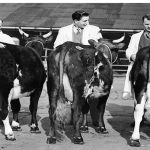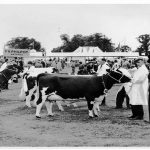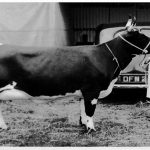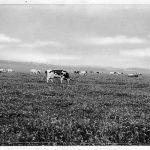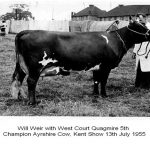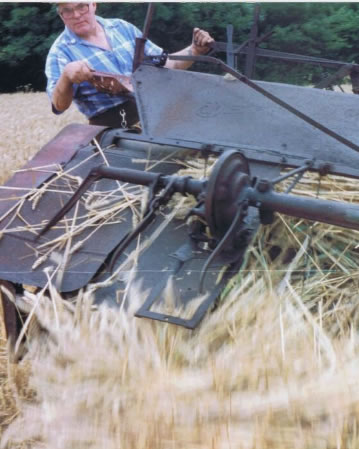
Jim Weir
About
| Farmer’s name | Jim Weir |
| Age | 58 |
| Location | Long Lane Farm |
| Size | 700 acres |
| Type | Arable |
Interviewed by: Anca Mamaische
Date: 23 April 2015
Transcript
Anca: Right. So first I would like to know a bit about your farm at the present moment. What type of farm do you have and what type of crops do you grow?
Jim: It’s mainly arable, … combinable crops, … shouldn’t I be get, I’ll get a list of the cropping. It’s about 700 acres in total…we’ve, of which we own 130 acres which is Long Lane Farm, the rest is rented from a private landlord, who lives in the neighbouring village, owns quite a bit of land locally. Formerly, we were tenant of a church commissioners, they sold it in 1989 I think, ’98 -1998.
Anca: So, are you talking about… you said that the church commissioners sold… what did they sell?
Jim: West Court which is the, the larger farm.
Anca: Oh. Ok.
Jim: Mhm.
Anca: So who purchased it?
Jim: Mr John Plumtree.
Anca: Mhm.
Jim: Sorry, you were asking about cropping [laughing].
Anca: Yeah, yeah. It’s ok, it’s ok, it’s perfectly alright, it’s all relevant information. So yeah, what type of crops do you grow, at the moment for example, this, this year?
Jim: This year we’ve got wheat, what’ve we got? 131 hectares of wheat..
Anca: Right.
Jim: Oilseed rape 82 and a half hectares and spring beans nearly 47 hectares.
Anca: 47?
Jim: Yeah.
Anca: Do you also have any animals?
Jim: Not of my own, no.
Anca: Right.
Jim: I’ve got about 27 acres of grass.
Anca: Mhm.
Jim: Which will be, is that 10 hectares is it? Somewhere, yeah, about 10 hectares which currently we’ve got 3 horses on DIY livery
Anca: All right.
Jim: and two donkeys [unclear, laughing].
Anca: I saw two ducks as well [laughing].
Jim: Yeah, three du.. three geese.
Anca: Oh, geese.
Jim: Yeah, yeah. Haven’t got any ducks at the moment. Yeah, we generally have a few hens -10 or a dozen – but we haven’t got any at the moment.
Anca: Mmm.. So what is a typical working day on the farm?
Jim: [laughing]
Anca: What do you do on the farm?
Jim: Well, first of all in 2005 I sort of packed up farming in my own right, running the day to day farming on myself, having employees, and used a contract farmer – so I’m not very involved with the actual farming nowadays.
Anca: All right.
Jim: Erm.. so I got.. probably most farmers have told you that it was too much paperwork, I suppose Bob too told you that.
Anca: I actually saw [laughing, unclear].
Jim: And sort of maintenance of buildings and we’ve got let cottages, you know I get called out to sort out dripping taps and so and so forth. I also get involved a bit with the environmental side, we’re in the Entry Level Scheme, … so yeah, I have to do some work on that, sort of controlling weeds and…
Anca: So that’s an agri-environmental scheme.
Jim: Yes, Entry Level Scheme. I also do on a part time basis some soil sampling for the Courtyard Partnership in Hutchinsons – local agronomy company.
Anca: Could you tell me how many employees do you have?
Jim: None now.
Anca: None now.
Jim: No.
Anca: Right. How about.. I don’t know.. last year or do you get seasonal workers during the…
Jim: Nope, no, the contract farmer comes in with his..Employees. He has three men on the arable side so they come in, do all the cultivating and drilling and spraying, fertiliser spraying.
Anca: Right. So currently you are working just with one contractor.
Jim: Yes, yeah, it’s a five year agreement we got at the moment which..
Anca: Has it been a long term partnership?
Jim: Yes, yeah, we’ve started in 2000 and, autumn 2005 and the current agreement runs to 2015.
Anca: Could you please tell me what happens to your produce? Where .. yeah, who do you sell to, how do you sell it.
Jim: Well, it all goes through merchants, and now I don’t get involved with the selling, the contractor, John Legger deals with that,
Anca: Ok.
Jim: but it gets to merchants, a lot of it goes to … I was gonna say SCATS, but they’re now Open Field, and Grain Harvesters.
Anca: Mhm.
Jim: Grain Harvesters is a local firm who they’ve recently been taken over by one of the national firms.
Anca: Mhm.
Jim: Yes, they’re all..
Anca: Yes, I came across Grain Harvesters before, Open Field is a firm as well?
Jim: Open Field is a Farmer’s Cooperative, they, yes. When we started their name was SCATS which is Seven Counties Agricultural Trading Society I think and they’ve gradually expanded and now they’re more or less a national firm.
Anca: Erm..
Jim: So yeah, you said where does it go?
Anca: Yes.
Jim: Erm..
Anca: How much.. sorry, how much it stays in Kent, how much goes into the EU or the Global Market? If you.. if you know about it.
Jim: Yeah [laughing]. Generally farmers often don’t know where it’s going. We sell it to a merchant and it goes anywhere, but…
Anca: Right.
Jim: But a lot of it goes onto boats, to go to wherever you know, mostly EU, Spain and so on, a lot of the wheat goes to Europe I think. Oilseed rape mostly will go up to Arif, so most of it stays in the country for crushing. We’re actually growing, they’re called whole rape which is high oleic low inoleic –acid I think, which is sort of better nutritionally and it’s what McDonalds and some of them are tending to use now, so there’s a bit of a premium pay for that.
Anca: Ok.
Jim: Yeah.
Anca: This.. this new.. it’s basically a new variety?
Jim: It’s not a variety, it’s a type rather than a variety.
Anca: Right.
Jim: There’s groups of varieties, and it so happens that, one of these varieties which is fairly new, it has come out as top yield among all seed rapes which hasn’t been the case up to know so more people are persuaded into it and the premium will go down [laughing].
Anca: Ok. How new do you reckon that it is?
Jim: What? The whole…?
Anca: This variety?
Jim: Oh the variety? Oh well, we’re not growing all this new variety, I think it’s been about two years or so, but we’ve been growing other varieties for, it must be about five or six years now I think.
Anca: Ok…
Jim: Oh yes, sorry, beans.
Anca: Oh yes.
Jim: If the.. if we get the.. the care of a crop right, which is mainly spraying for bruchid beatle which bore into beans.
Anca: I came across it.
Jim: You did? Aha. If it’s a good sample they’ll go to Egypt or somewhere in North Africa for human consumption.
Anca: Right. So how about the local market? The UK market?
Jim: I don’t know, it will be a feed market for them if they come up to scratch for human consumption, but they’re actually they’re sold on contract, they have been anyway, don’t know about this year to a local firm Dens and they organise boats for the Egyptian trade.
Anca: Have you ever worked with supermarkets?
Jim: No, no.
Anca: No, could you tell me why?
Jim: Because the… we’re producing the raw product which is going off to make bread or…
Anca: Right. How about the beans? Have you ever thought that you could work with a supermarket?
Jim: No, no. I mean it’s a foreign, the human consumption is a foreign market so they’re you go. You know, suited for that or going into animal feed so.. yeah, and the oil seed rape some farmers now are pressing their own seed rape to produce bottled rape oil but that’s a very specialist job so, and ours just goes in with the…
Anca: So you’re not aiming towards that?
Jim: No, no. At the moment anyway we don’t. No. Only it’s the sort of vegetable and market garden where farmers are dealing directly with supermarkets.
Anca: Has the Russian embargo affected you in any way?
Jim: It probably a bit pricewise for things, but not directly.
Anca: Could you tell me what’s your view on organics?
Jim: A! [laughing] Wonder what Bob said about organic. Yes, many years ago I did look into going along that line but really got scared about the aspect of not being able to control things with chemicals. Otherwise yeah, lot of.. the principles are alright and in a way mainstream is going more towards organic. So we don’t want to spend money on any more chemicals than we have to, and we are getting problems with resistance to chemicals..in both weeds and.. weeds, pests and fungal diseases. So in a lot of ways we are moving towards organic farming, in some ways. I got nothing against organic farming other than some of ‘em are a bit bigoted [laughing].
And I don’t feel that we can feed the world if we go entirely organic probably.
Anca: Right. Could you tell me about your own background in farming? If you, yeah, when did you, you already mentioned that, but when did you started, what made you become a farmer?
Jim: Born into it [laughing].
Anca: Born in to it.
Jim: Yeah, I’ve lived here all my life, my father and his two brothers and his father and mother and sisters came, moved here from Scotland in 1936 took the tenancy here. Yeah. I did school, sort of wandering about, perhaps going into a veterinary profession but decided to go with farming. So I went to Hadlow Agricultural College, Agricultural and Horticulture College for a three year OND and agriculture course.
Anca: Did you saw it more like a duty, like a family duty or were you ..
Jim: [Laughing] In a way, yes. I didn’t, I wasn’t pressurized to do it at all. Mhm.
Anca: So, at the present moment what does your farm mean to you and what does farming mean to you?
Jim: [laughing]
Anca: This is more of a personal question.
Jim: Yeah.. well, given that I am not longer hands on it sort of gives the impression that I don’t really care all that much but you know, that isn’t the case. I am very passionate about the farming and countryside in general and yes, look after the countryside and making the most of our land to produce our own food. What was the other part of the question?
Anca: Well, the first one was what does your farm mean to you and the second one what does farming mean to you?
Jim: Aha, mhm.. what does the farm.. well, yes, having lived here all my life you know it’s.. [laughing]. Some time I’ll have to retire and leave it but haven’t got any plans at the moment.
Anca: So since you’ve been here on this farm. Could you tell me about the main ways in which… sorry, the main ways in which your farm has changed through, over the past 50 years?
Jim: [laughing].
Anca: What are the main changes that you..
Jim: Main changes. Well the main things will be 1) sort of a… we moved to more or less arable cropping from very mixed farming. When my grandfather and his sons came here, they’d have Ayrshire dairy cows, beef crosses from them, sheep..
Anca: So when was that? In the ‘40s?
Jim: Yeah, they came here in 1936. Yeah and then.. and yeah, a few pigs I think they had deep litter poultry and a certain amount of wheat and barley. I don’t think they’d growing any arable crops other than wheat and barley except for root crops for feeding the animals. We used to grow, even in my day, we used to grow, sweeds, manguerzal and kale, for the stock.
Anca: So how the, why do you think that the, this change happened from…?
Jim: Economies of scale really, and you know, specialising so you’ve got the knowledge in your area that you’re specialising in and the machinery and so on for that rather than spreading everything too thinly. And of course, as I told you, I’m aone man band now but bringing the contractors men in, just basically three man but they are not here full time, they probably spend, I don’t know, probably a fifth or even less of their working time here. And, when I started on the farm here, which would be in the 1970s, we’d have three men on the dairy side and probably four others, four or five others.
Anca: So more employees.
Jim: Yeah, that gradually reduced over the years
Anca: So do you reckon that this reduction took place due to the nature of the.. the business now or…
Jim: Yeah, mechanisation and yes, we got out of dairying in the early ‘80s so that took away a lot of the labour requirement. We were milking about 70 cows when we were milking, and then after that we kept a few cows and multiple suckle calves on them and did that for a while and after that…
Anca: Could you, could you approximate the year maybe, the period?
Jim: We were, that would be somewhere around ’83 to the end of the ‘80s. We still had some sheep at that time.
Anca: Has your farm increased in size over time or decreased?
Jim: Very slightly [laughing]. Yes, we… when the neighbouring farm was, we let, must have been 40 or 50 years ago, we got 24 acres from there, which actually the steading here is right in the corner of the farm so the field we gained isn’t very far, over there.
Anca: Mmm..
Jim: and then we’ve got about 40 acres on a farm business tenancy actually from our new landlord, which was again part of the neighbouring farm which we had since, it could be late ‘80s I think.
Anca: Yeah, you mentioned the neighbouring farms. Do you reckon that they’ve changed a lot as well?
Jim: Yeah, yeah.
Anca: In similar ways or they, they…
Jim: Similar, yeah, mhm.
Anca: Are there any farms that, I don’t know, have ceased their activity around this area, that you are particularly aware?
Jim: Oh, well. Yes, it was some which have been amalgamated with neighbouring farms, yes. Two that., actually one that we had a small area of and yeah, that is no longer a working farm on it’s own right and another one at Barfriston which actually sort of kind of similar to what I’m doing which still the…farming tenant died but his daughter and son in law still have the tenancy, but they’re using another of my neighbours to do all the work.
Anca: Right… so about…why do you think that all these changes are happening? And I’m think more particularly about the external factors like policies, I don’t know DEFRA, CAP policies, the EU and so on. How do you think that these, all these affected you through time? In, yeah, what are the major events that affected you?
Jim: Ah [laughing]. I don’t know whether we’ve had DEFRA or a different set up it would have made a lot of odds, I think it’s all more economics, basically, the economies of scale as I said, and the fact that we’re now in a global market rather than in a national market, so yeah, the prices of produce – be it crops of livestock – is governed by what’s happening throughout the world so that impacts on what’s viable to produce I think.
Anca: Do you, do you see a negative impact or a positive impact? How opening the gates towards international markets has affected you?
Jim: A bit of both I guess [laughing].
Anca: A bit of both, ok.
Jim: Yeah. As I mentioned we’re exporting beans to Egypt and so on and if everything stayed at home we wouldn’t that..
Anca: Yeah
Jim: But of course we suffer from cheap products going out.
Anca: Did the university of Kent had any impact on your farm throughout time?
Jim: Not really, no. I don’t think [laughing].
Anca: I think this is the last section and it’s about how do you see your farm developing in the future? Yeah, first of all what are the main challenges and threats on your farm at the moment and how do you reckon that they’ll evolve through time?
Jim: [laughing] Erm..
Anca: I’m thinking of maybe disease, pollinators, .. politics, economics.
Jim: Mhm.
Anca: And also environmental issues.
Jim: Aha, yes, at the moment the markets are somehow depressed which obviously has a big effect on profitability. I mean we keep getting told that population is going up, we need to feed the world, but at the moment prices we’re getting don’t suggest that, well and the physical situation isn’t such that demand are outstripping supplies, at least for those that can’t afford to pay for it unfortunately. So, yeah I think, yeah, the competition from abroad is a big part of the equation, of course as we are being told there should be a big market in the future which will hopefully will bring a demand for our produce. Yeah, I think the farm are going to inevitably continue to get bigger, one farm gets swollen up by another, along with perhaps cooperation of neighbouring farmers which is happening now and will probably continue and technology will move on and we’ll be doing more with robots and monitoring diseases and so on for timing your sprays with new advances.
Anca: Yeah.
Jim: What have I missed [laughing]?
Anca: You said that farms tend to get bigger, how about your farm, do you have any plans in this respect? Do you plan to extend or…
Jim: Not really, I haven’t got anybody to follow on, so don’t envisage changing a great deal I’m afraid [laughing], which maybe sounds a bit negative. Yeah, if I had someone to follow on it would be a different story I guess.
Anca: You also mentioned technology. Do you see it happening in the distant or the near future? Because we don’t have robots yet that, or maybe we do?
Jim: There are robotic tractors that they’re in development, you know, in research – in universities and research places. So no, I think it will be gradual and the government are trying to encourage more research and specifically applied research now which is good and hopefully that will continue and move on, but just how quickly is anyone’s guess.
Anca: Yeah. We haven’t touched yet on environmental and conservation aspects.
Jim: Yeah. No.
Anca: You said that you are in a few.. well in one..
Jim: Entry Levels.
Anca: Entry Levels.
Jim: Mhm. Actually yes, the EU has had an impact on that, you were asking about that with the new Basic Payment Scheme that has just come in. Some of the.. no, a large proportion of the elements of the Entry Level Scheme have been deemed to be covered by double funding where the same thing such as field margins, nectar strips and so on could be funded under the greening side of the Basic Payment Scheme and we’re also in the Entry Level Scheme. So for the Basic Payment Scheme we also have to do a certain amount of this greening measures and it was deemed even if the element that we’ve got in the Entry Level Scheme we had enough other things that would constitute the greening for the basic payment scheme so we didn’t need to use the things that’re now in the ELS, don’t know if you’re following.
Anca: It sounds a bit complicated.
Jim: Yeah. Well, anyway, they’ve reduced the payments for a lot of the things in the ELS, so we had to do some extra things in our ELS scheme, and still haven’t managed to do enough to make up quite the payment that we were getting before and we don’t get nearly as much but..
Anca: So how do you feel about that?
Jim: Somewhat miffed, especially as I went into currently ELS Scheme on the first of January 2012 was it? which was, if I’ve gone into a month before I would’ve still got the payment for what I was doing before. So yeah, somewhat miffed on that. Such is life [laughing].
Anca: Do you plan to participate in these schemes in the future or..
Jim: Well..
Anca: Once this contract for example..
Jim: Yes, so it’s going to be competitive in the future unless my scheme runs to the end of next year, end of 2016, so actually that’s something I ought to look into, whether ‘cause other people will be getting into a new scheme from this year, so I don’t know if having mine running ‘till then, whether there there will be the opportunity to get into it then or whether there will, sort of, opportunity will be taken out by others by that time. But yes, I am quite keen on that side.
Anca: Right.
Jim: As long as it it doesn’t get too silly [laughing].
Anca: I think that we’ve covered pretty much everything. If there is.. Yeah, before we.. yeah, take a look through those documents, is there anything that you would like to add? Anything that you thinkg that maybe I haven’t covered .. particularly in ts of changes over the past 50 years.
Jim: Yes. Haven’t really mentioned the sheep very much. I mean we were, we had I think it was about 400 ewes, that would be until the ‘90s I think somewhere, and we were employing a shepherd who was mainly involved with the sheep, a few other things on the farm, but mainly sheep. So yeah, other than that we’ve roughly covered most of it I think.
Anca: Right, well, ok then… I don’t think there is anything else but we can come back. I am going to stop this recording.
….
Jim: So the family came down to take a tenancy in 1936 from South West of Scotland and they had the dairy herd up there. There was a lot of farmers who came from Scotland down to this area and other areas in England in the 1930s which was a depression time, and they were, the tale I got from father and so on, was that they were overrun with rabbits and.. [laughing] a lot of work, droving them out so they actually brought the herd down with the train from Scotland to Shepherds Well station and then walked them up to the farm here, which is about ¾ of a mile I guess. So, the Ayrshires were a large part of my father and uncle’s interest, and I wasn’t quite so keen, and it was the main reason that we packed up…[laughing].
Anca: So, I forgot to ask this, for how many generations before you your family has been involved in farming.
Jim: The short answer is “I don’t know” but certainly grandfather and his father would be farming in Scotland before that. Beyond that I don’t really know but yeah, the grandfather and his three sons were partners here. The firm’s name is J.Weir and sons, which is the orginal name, J. Weir would mean John Weir, my grandfather, and then he was in partnership with three sons, one moved back to Scotland, the younger one, wanted to do his own thing, moved back to Scotland in the 1960s. And then it was father and uncle, they were partners after grandfather died. Yeah, so, they were keen of showing the Ayrshires. Actually before that, don’t think they showed it here, but grandfather was into showing poultry so that’s.. that’s from Scotland.
Anca: Is that a rooster? [looking at a picture]
Jim: Yeah, that’s a cockerel or something. So that’s your truly as a boy, at Kent Show.
Anca: So what breed?
Jim: That’s an Ayrshire, they’re red and white generally. So that’s a cutting from when the Ayrshire Cattle Society came here in 1973, that’s my father and uncle with one of our cows again at the show. These are all Ayrshire cattle.
Anca: Beautiful.
Jim: And, the other bits and pieces that I’ve got. There is, there is, this is a Farm Sale Catalogue from when the, the firm came here in 1936, Tuesday, 29 of September 1936 farm sale. So that’s quite interesting, there were all these horse drawn implements in the sale. There’s an overtime tractor. ….This is a card with the things that my family bought, the lot numbers and the prices there.
Jim: King roll?
Anca: I think it’s Ring roll.
Jim: Oh Ring Roll, that makes sense [laughing].
Anca: I still don’t know what it is.
Jim: It’s for firming the ground after you’ve cultivated the..
Anca: Oh yeah.
Jim: Same as you.. well some people roll grass rolls, yeah. Binders, that was the predecessor of combined harvesters.
Anca: Updated tractor I suppose.
Jim: Low pressure pneumatic tires. Early tractors had iron tires. Mmm.. that’s all in..
Anca: Very interesting.
Jim: I mean. So that’s that sale. Yes. I actually, I actually got that scanned on the computer so that could save the effort.
Anca: I would appreciate that, I would .. I can give you my email address.
Jim: Aha. And this is the farm sale when the contractor came in, when.. I sold most of my machineries, so that’s more modern machinery.
Anca: Do you have by any chance any of the old machinery. Do you keep it for.. you know.
Jim: I’ve.. I’ve kept.. I’ve kept two of the smaller tractors, .. and because I.. for the.. I didn’t tell you was the grass.. haven’t got my own animals anymore. I let it out, apart from the two donkeys, and so I put a bit of fertiliser on that if it’s wanted so I’ve got a fertiliser sprayer, mower and topper, also got a bailer, fork lift, that’s the bulk of the machinery that I’ve kept, a few trailers, yeah.
Anca: Should I maybe give you my email address?
Jim: Yeah.
Jim: The other thing, I can email you some information on this if you like. I said the farm was owned by Church Commissioners and that one time it was sort of resting house and it was tied to St Martin’s Priory in Dover.
Anca: Ok. So do you know, when was that?
Jim: Ah.. I am not very good at keeping these things in my head, but if you like I can email you some [unclear 09:24].
Anca: If you have them, absolutely.
Jim: That’s for listing of the farmhouse here [mumbling].
Anca: So how old is this building, this farmhouse?
Jim: Well it’s.. it’s supposedly mentioned in Doomsday Book, it is down as just a Manor House, Sibertswold the other name for Shepperdswell. But it’s all been added to over the years, like modern proprieties. And in the, up in the roof is the crown post from the days beyond the old days which is covered in soot from the open fire. And the, it’s not English Heritage, but the, something rather with, a society for historical monuments or something rather, they did a survey of the house and they did core dating, dendrochronology, or something. Where you get the, you analyse the tree rings, yeah, the growth rings to date the wood and that was somewhere in the 1400s I think.
Anca: Right.
Jim: Quite impressive.
Anca: Yes, an interesting house.
Jim: A beautiful one [lauging].
Anca: Aha.
[drawing my attention to the garden]
Jim: A woodpecker eating the nuts.
Anca: Oh yeah.
Jim: I think that’s covered the bulk of what I’ve got. Oh, that was another thing from history, [laughing]. Shepherdswell’s recently formed a History Society and they. Have you heart of the Tithe Wars?
Anca: I am afraid not.
Jim: Yeah. It’s.. has to do with church. Erm.. and Tithe is a tenth, and one time the church taxed farms and this was like a rebellion against that and it was.. I think he’s from Christ, is it John. That’s that Christ Church, is it Canterbury, you know?
Anca: Yes, it should be, it should be.
Jim: ‘Cause you’re..
Anca: It should be Christ Church.
Jim: Yeah, mhm. Yeah, he’s at Christ Church, not at your University but he’s chairman of, lives in Shepherdswell, he’s chairman of the History Society so if you research this you should go and talk to him.
Anca: Erm.. I will look into it, first of all to see what the Tithe War was about and then maybe yeah.. I’ll understand a lot more about that.
Jim: It’s more than 50 years ago but ’34.. yeah.
Anca: Do you have that scanned as well?
Jim: Erm, I think so, I should make a note.
Anca: I think it’s quite relevant.
Jim: Yes, I think so, yes. I’ll make a note.
Anca: I think it’s quite relevant.
Jim: Yes, yeah. Actually, John Bulatis was going to give me his PowerPoint presentation on it but he never has yet. I mean, if you’re interested in that I am sure he’ll be keen to talk to you about it. Do you want his email address. Well, I’ll send you that anyway ‘
Anca: Yeah, yeah. Exactly.
Jim: Right, what else have we got here? Oh, that’s just something that I found which is the Last Canterbury Fatch Stock Show. Canterbury Market, that’s 1997, it’s been developed for housed now – Canterbury’s. Ashford is a local big market now.
Anca: So you said the last one.
Jim: This was the last, yeah, Canterbury Show before the market closed. They had you know, competition for all the various classes of fatstock. We used to show sheep…
Anca: So has it been replaced with a, I don’t know, a different event or I don’t know how..
Jim: No. Not. This is the Ploughing Match, it was going, the Ploughing Match was going currently anyway but no. I mean, there’s Ashford has a big show sale, fatstock show sale, but Fin’s, G.W. Finn & Sons Canterbury auctioneers packed up selling livestock and that is that as far as Canterbury show, fatstock show. Oh, the other thing that might be of interest from the farm here, we, my family, hosted the first post war East Kent ploughing match, which was – I’m not sure – yeah, and also in 1994 which was the 50th anniversary of that. We hosted the 50th one. And now that’s, that will be of interest to you.
…
Anca: Were you a part of Young Farmers’ Club?
Jim: I was, yeah. Canterbury Young Farmers.
Anca: Quite a bit of history.
Jim: Aha. Oh. Not farming, but one of the potential sites for shale gas investigations was on our farm. I don’t know whether that’s…
Anca: Absolutely. So what happened in the end?
Jim: Well, it died a death. There was a lot of local opposition and it’s, I mean it might come back again. My landlord is very keen and I’m not [laughing].
Anca: Why not?
Jim: Well, no. I’m yet to be convinced on the safety of it, and b) I don’t want a lot of protestors on my doorstep particularly [laughing].
Anca: Yeah. How about the financial side of it, wouldn’t..
Jim: Well, I wouldn’t.. I wouldn’t.. I’d get a bit of compensation, you know, but not a lot.
Anca: Yeah.
Audio
Photos and Documents
Jim Weir Interview Archive – Download .pdf version
History of West Court 4 – Download .pdf version
Shipwell History Society 1812-1814 Battle of The Ducks – Download .pdf version
West Court Listing 27/08/1952 – Download .pdf version
- WestCourt Dewdrop, Dolores & Deanna 6th
